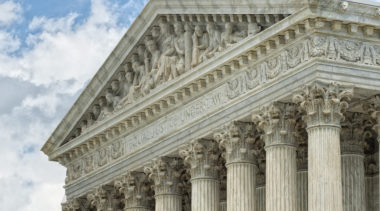Latest
-
Portland’s Pension System Is Dependent on Property Values Rising
As long as the city enjoys robust property value appreciation and collects most of its tax levy, FDPR’s funding mechanism should remain sustainable.
-
Amicus Brief: Bridge Aina Le‘a, LLC v. State of Hawaii Land Use Commission
This court should grant the petition for certiorari to safeguard the landowner’s fundamental right to a jury’s determination of the effect of the government’s taking and to reaffirm the Seventh Amendment guarantee of right to trial by jury.
-
How Contracting Improves the Service Quality and Accountability of Mass Transit
Contracting deploys a robust set of tools to improve the service quality of mass transit systems.
-
Despite Budget Deficit, Texas Must Stay Committed to Funding State Pension Plans
The state needs to maintain consistent payments to the retirement systems and adopt more risk-averse plan assumptions to protect worker benefits and prevent Texas taxpayers from being on the hook for more debt.
-
Oregon Supreme Court Ruling Has Major Implications for Retirement Security and Hybrid Plan Design
The court's ruling has far-reaching implications for hybrid retirement systems like Oregon’s.
-
Five Steps to Guide Transportation Spending and Planning During Coronavirus Pandemic
An approach to understanding and addressing the new challenges the coronavirus pandemic and recession bring to infrastructure funding and planning.
-
The U.S. Supreme Court and the Contract Clause Today: Implications for Public Pension Reform
Who would benefit the most from a “conservative” reading of the Contract Clause? Public-employee unions.
-
It’s More Important Than Ever to Let Education Funding Follow Kids
A massive crisis like the coronavirus pandemic is not the time to limit options for families struggling to find a way to balance their health, kids’ educations and parents’ careers.
-
Pension Funds Should Reject Politically Motivated Divestiture
Divestiture policies based on political interests extend beyond the role of public pension fund managers and are very unlikely to accomplish the intended outcome.
-
California Supreme Court Upholds Pension Reform Twice, But the “California Rule” Persists
These two cases do provide some welcome clarity around the edges of the California rule.
-
Montana Should Reject Proposed Ban on Flavored Vaping Products
Montana's Department of Public Health and Human Services is pushing to permanently ban e-cigarette flavors in the state.
-
How Congress’ Proposed Marijuana Banking Reform Would Boost Government Budgets
Marijuana banking law reforms could help the economy, state and local governments, small businesses, and be a net positive to the federal budget.
-
How Transit Systems Can Provide Cost-Effective, High-Quality Paratransit Services
People with disabilities use transit seven times as much as the general population.
-
Surface Transportation News: Diverting Gas Taxes to Amtrak, Toll Road Traffic Recovering, Hyperloop and More
Plus: The fiscal impact of automated vehicles, a poll on gas taxes and mileage fees, a ruling on availability payments being debt, and more.
-
Best Practices for Providing Education Funding for Economically Disadvantaged Students
This report examines federal education funding for student poverty and how state education finance systems can best fund students.
-
Bill Would Allow Gig Economy Workers to Get Personal Protection Equipment From Companies
Many unnecessary federal regulations have prevented adequate access to PPE.
-
How Government-Mandated Gym Closures Hurt Public Health and the Economy
The state’s current approach—forcing most health clubs to stay closed—is not a healthy prescription for citizens or businesses.
-
Vital PPE: How To Increase Production and Distribution of Masks to Fight COVID-19
Part six of a series discussing strategies for combating and recovering from the coronavirus pandemic. The important role PPE has in containing the coronavirus and returning to pre-COVID-19 economic activities.

















